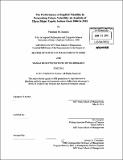The Performance of implied volatility in forecasting future volatility : an analysis of three major equity indices from 2004 to 2010
Author(s)
Ionesco, Vladimir M. (Vladimir Michae)
DownloadFull printable version (2.724Mb)
Other Contributors
Sloan School of Management.
Advisor
Eric Jacquier.
Terms of use
Metadata
Show full item recordAbstract
In this thesis, we investigate whether implied volatility is an efficient estimator of future one-month volatility from an informational perspective and whether it outperforms historical volatility in this regard. We first compare the predictive powers of implied volatility, simple historical volatility, and exponential historical volatility, using monthly observations of the S&P 500, FTSE 100, and DAX equity and option markets from 2004 to 2010. Then, we introduce a GARCH(1,1) model and compare in-sample GARCHfitted volatility and implied volatility from 2004 to 2010, as well as out-ofsample GARCH-forecasted volatility and implied volatility from 2005 to 2010, using data on the S&P 500. We find that implied volatility is not only an efficient estimator of future volatility, but also that its information content is at least as good, if not much better, than that of historical volatility. Our results also suggest that implied volatility systematically subsumes the information included in historical volatility, even when a GJR-GARCH model is utilized.
Description
Thesis (S.M.)--Massachusetts Institute of Technology, Sloan School of Management, 2011. Cataloged from PDF version of thesis. Includes bibliographical references (p. 29).
Date issued
2011Department
Sloan School of ManagementPublisher
Massachusetts Institute of Technology
Keywords
Sloan School of Management.